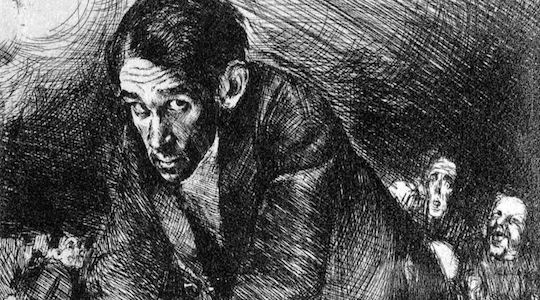Bruno Schulz (1892-1942) is one of the relatively few Polish authors of fiction who enjoy international recognition. Originally published in the 1930s, since the early 1960s the Polish-Jewish writer and visual artist’s oneiric short stories have been translated and retranslated into almost forty languages, despite their seemingly untranslatable style: an exquisitely rich poetic prose, comprised of meandering syntax and multi-tiered metaphors. In English-speaking countries, Schulz’s name was made in the late 1970s, when his Street of Crocodiles, first published in English in 1963 in both the UK and the US (the British edition was titled Cinnamon Shops, following closely the original Polish Sklepy cynamonowe), was reissued in Philip Roth’s influential Penguin series Writers from the Other Europe (1977), alongside Milan Kundera and other authors from behind the Iron Curtain whom the West had yet to discover. Schulz’s second story collection, Sanatorium under the Sign of the Hourglass (Polish: Sanatorium pod Klepsydrą), followed shortly (1978), and ever since then both volumes have been regularly republished and reprinted, as well as in series such as Picador Classics (1988), Penguin 20th Century Classics (1992), and Penguin Classics (2008).
This summer, the Northwestern University Press announced that “an authoritative new translation of the complete fiction of Bruno Schulz” by Madeline Levine, Professor Emerita of Slavic Literatures at the University of North Carolina, is forthcoming in March 2018. Commissioned by the Polish Book Institute and publicized already since 2012, this retranslation has been impatiently awaited, especially by Schulz scholars dissatisfied with the old translation by Celina Wieniewska. Indeed, it’s great that Levine’s version is finally going to see the light of day—it is certainly going to yet strengthen Schulz’s already strong position. Unfortunately, the preferred (and easiest) way of promoting retranslations is to criticize and ridicule previous translations and, more often than not, translators. Even though the retranslator herself has spoken of her predecessor with much respect, showing understanding of Wieniewska’s goals, strategies, and the historical context in which she was working, I doubt that journalists, critics, and bloggers are going to show as much consideration.
In an attempt to counter this trend, I would like to present an overview of the life and work of Celina Wieniewska, since I believe that rather than being representative of a certain kind of invisibility as a translator (her name brought up only in connection with her ‘faults’), she deserves attention as the co-author of Schulz’s international success. Much like Edwin and Willa Muir, whose translations of Kafka have been criticised as dated and error-ridden, but proved successful in their day, Wieniewska’s version was instrumental in introducing Schulz’s writing to English-speaking readers around the world. Before Levine’s retranslation takes over, let’s take a moment to celebrate her predecessor, who was a truly extraordinary figure and has been undeservedly forgotten.

